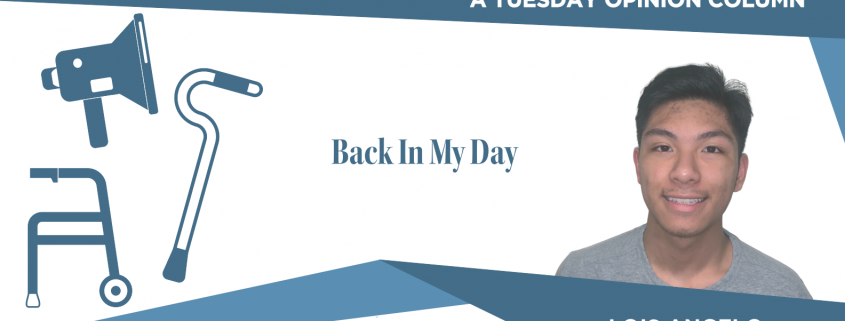Back in My Day: Careers in aging are diverse and aplenty
Time and time again, you’ve probably heard me mention the rapid growth of the older adult population in the next few decades. Nonetheless, it’s a reality that everyone must face. Modern medicine, from preventative care to increased health literacy, along with social services — the Administration of Aging and geriatric services — are some of the many factors contributing to such development. Seeing that the election will play an important role in the future of older adult care and services, let’s double down on the role that we can play as college students in the near future.
The world of aging does not limit itself to our discussions in academia or the skilled nursing communities that I referred to in my last column. Aging, in many ways, is a marketable and interdisciplinary field. Looking at the tech sector, there’s a clear and immediate need for gerontologists to help critique and develop simple and reliable technology geared more toward older adults. For the public policy and politically oriented folks, there’s room for advocacy on behalf of those diagnosed with Alzheimer’s or various forms of dementia. As mentioned above, knowing the fundamentals in the psychology of aging can open pathways to academia and research. For myself, I plan to head off to medical school — Caribbean or not, but probably the former — and pursue a fellowship in geriatric medicine soon after. In short, there’s definitely a niche or space for you.
I haven’t even touched on the media and journalism side of aging. You might have seen initiatives to help preserve the stories of older adults through video interviews, university oral history archives or movies. One that often comes to mind is the StoryCorp program geared toward those diagnosed with some form of dementia, named the StoryCorp Memory Loss Initiative. Here, the stories of older adults can be shared to the StoryCorp project and are automatically uploaded to the Library of Congress collection in conjunction with the StoryCorp collection. Working in the Davis School of Gerontology’s Communication Office, I know that we have a handful of opportunities where we try not only to increase our presence in the world of aging but also to showcase intergenerational interactions at the University.
“But Lois,” you, the inquisitive reader asks. “Isn’t gerontology and the field of aging as a whole really just one massive interdisciplinary field that is working to better orient itself to the care and assistance of older adults?”
A weirdly specific question, but yes. The field of aging continues to be an incredibly complex and interdisciplinary field given its implications for almost every job sector. Even more, there’s an 18% increase in the number of older adults in our current workforce since 2015, illustrating the need and care these individuals may require once they opt into retirement options.
However, I implore that you learn more about older adults before jumping into the field via trial by fire. Many can join the age bandwagon and dig out a niche in the field. Upon doing this, however, they might realize that working with the older adult population may not necessarily be their forte. So, here are a few classes offered by the School of Gerontology that could ease the transition or affirm your passion of helping older adults.
“Administrative Problems in Aging” provides some insight into the field of aging from an administrative standpoint. Currently taught by adjunct lecturer Tameka Brown, the class delves into topics such as working with and developing a human resources department, delegating responsibilities to coworkers and establishing a healthy work environment, all while taking older clients and employees into consideration.
“Medical Issues of Older Persons: An Introduction to Geriatrics” illustrates the changes in preventative care and treatment of age-related diseases throughout history while also providing insight on the current steps being taken to tackle issues among today’s group of older adults. With Ed Schneider, professor of gerontology and Emeritus Dean of the Andrus Gerontology Center, it’s sure to be an exciting and fun class.
“Neurobiology of Aging” with John Walsh, associate professor of gerontology and assistant dean of education at the Davis School, is another exciting class geared more toward the science component of gerontology, looking more at cognitive function and the nervous system.
There are plenty more classes in the gerontology school as well that you should definitely give a look, particularly Maymesters and some of the smaller two-unit classes.
Outside of taking those fun gero classes, try and find some opportunities to work with older adults where you’re able. At the moment, it might be incredibly difficult to find any in-person opportunities, or even hybrid volunteering, for that matter. That being said, many opportunities for getting involved or even just learning about possible careers in aging are being hosted by some clubs on campus.
From the Student Gerontology Association to GeroTech to the Medical Gerontology Association, there are places that allow for interaction with older adults, albeit through Zoom or other means. Many older adults are learning to adjust to these new and constantly changing circumstances as they continue to stay indoors and hope the pandemic clears soon. Internships at institutes such as SCAN or the Milken Foundation at its Center for the Future of Aging can certainly give you a better look into how aging is being transformed and better understood.
Bringing it all together, careers in aging are for any and all majors, and the opportunities in this promising field are endless and malleable to your personal and professional goals. Hopefully by the time we’re older — maybe after retiring from a career in aging — we look back at the progress we’ve made for the field of gerontology and reminisce, saying, “Back in my day…”
Lois Angelo is a sophomore writing about the intersections of gerontology and social issues. He is also co-chief copy editor of the Daily Trojan. His column, “Back In My Day,” ran every other Tuesday.

